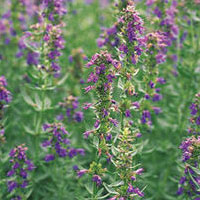Hyssop
 © Martin Wall
© Martin WallParts Used & Where Grown
Hyssop reportedly originated in the area around the Black Sea in central Asia and today is widely cultivated in other arid regions, partly because it thrives even in the most desolate soils. Hyssop’s fragrant flowers and leaves are used as medicine.
- Reliable and relatively consistent scientific data showing a substantial health benefit.
- Contradictory, insufficient, or preliminary studies suggesting a health benefit or minimal health benefit.
- For an herb, supported by traditional use but minimal or no scientific evidence. For a supplement, little scientific support.
Our proprietary “Star-Rating” system was developed to help you easily understand the amount of scientific support behind each supplement in relation to a specific health condition. While there is no way to predict whether a vitamin, mineral, or herb will successfully treat or prevent associated health conditions, our unique ratings tell you how well these supplements are understood by the medical community, and whether studies have found them to be effective for other people.
For over a decade, our team has combed through thousands of research articles published in reputable journals. To help you make educated decisions, and to better understand controversial or confusing supplements, our medical experts have digested the science into these three easy-to-follow ratings. We hope this provides you with a helpful resource to make informed decisions towards your health and well-being.
This supplement has been used in connection with the following health conditions:
| Used for | Amount | Why |
|---|---|---|
Asthma | Refer to label instructions | Hyssop, which has a soothing effect on bronchioles, has traditionally been used for asthma. |
Colic | Refer to label instructions | Hyssop has mild sedative properties and may also be helpful in relieving colic, but research is lacking. |
Common Cold and Sore Throat | Refer to label instructions | Hyssop may promote a healthy fever and the immune system’s ability to fight infections. |
Cough | Refer to label instructions | Hyssop has a long history of use for relieving coughs. |
Traditional Use (May Not Be Supported by Scientific Studies)
The most common uses of hyssop in traditional herbalism have been to relieve chest congestion and coughs, to soothe sore throats, and to act as a mild sedative.1 Some herbalists consider it stronger for relieving gas or intestinal cramping than for easing a cough.2 In addition to using hyssop for the above conditions, early 20th century Eclectic physicians (doctors who recommended herbs) in the United States used the herb topically to soothe burned skin.3
Copyright © 2026 TraceGains, Inc. All rights reserved.
Learn more about TraceGains, the company.
The information presented by TraceGains is for informational purposes only. It is based on scientific studies (human, animal, or in vitro), clinical experience, or traditional usage as cited in each article. The results reported may not necessarily occur in all individuals. Self-treatment is not recommended for life-threatening conditions that require medical treatment under a doctor's care. For many of the conditions discussed, treatment with prescription or over the counter medication is also available. Consult your doctor, practitioner, and/or pharmacist for any health problem and before using any supplements or before making any changes in prescribed medications. Information expires December 2026.
